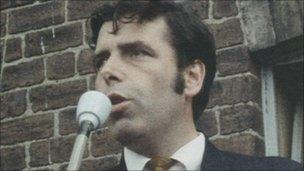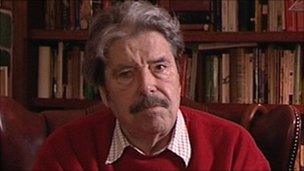Shipyard union leader Jimmy Reid dies
- Published

Mr Reid's speech to shipworkers was broadcast around the world
Former Glasgow shipyard union leader Jimmy Reid has died at the age of 78.
Mr Reid led a successful work-in at the Upper Clyde Shipbuilders (UCS) in 1971 which thwarted the Tory government's attempts to close the yards.
The one-time Communist Party member later moderated his views, and stood for Labour in the 1979 election.
After failing to win the Dundee East seat he became a respected journalist and broadcaster, and joined the SNP in 2005 after losing faith with Labour.
Mr Reid, who died overnight, had suffered a brain haemorrhage earlier in the week. He is survived by his wife Joan and their three daughters Eileen, Shona and Julie.
The shipyard work-in - organised by Mr Reid and fellow shop-stewards Jimmy Airlie and Sammy Barr - was an alternative to a strike.
It came after the new Conservative government insisted that shipbuilding should not rely on government subsidies, and refused to hand over more money to keep the UCS yards open.
The decision meant at least 6,000 of the 8,500 shipyard workers employed by UCS would have to be made redundant.
The work-in saw workers manage and operate the UCS shipyards until the government changed its policy.
It was intended to prove that the yards were viable, and Mr Reid insisted on tight discipline to ensure workers projected the best possible image.
In a famous speech to workers, broadcast across the UK and beyond, he said: "We are not going to strike. We are not even having a sit-in strike.

The former Communist gave his backing to the SNP in 2005
"Nobody and nothing will come in and nothing will go out without our permission. And there will be no hooliganism, there will be no vandalism, there will be no bevvying because the world is watching us."
The well-orchestrated campaign attracted widespread public support, with a series of fundraising events being held for the workers and celebrities including John Lennon and Billy Connolly giving their backing.
The Ted Heath-led government finally relented in February 1972 and announced a £35m injection of cash into the yards at Govan, Scotstoun and Linthouse.
Within three years, shipbuilding on the Upper Clyde had received about £101m of public grants and credits, with £20m going to the UCS.
Mr Reid, who suffered a suspected stroke in 2002, went on to write columns for several newspapers, and won two Bafta awards for his Reid About the USSR series of documentaries.
He also hosted the Reid Report current affairs programme for BBC Scotland.
Scottish First Minister Alex Salmond paid tribute to Mr Reid as "Scotland's great rallying figure over the last four decades".
Mr Salmond added: "He loved Scotland and her people - it was this commitment that drove Jimmy to defend the jobs and communities of the upper Clyde when he first shot to prominence nearly 40 years ago, with his inspirational and successful leadership of the UCS work-in.
"Jimmy Reid was Clyde-built. He has been Scotland's great rallying figure over the last four decades, and was one of the few Scottish political figures who can genuinely say that they provoked real change for the better in society - always addressing both a Scottish and international audience. Above all, Jimmy was a warm, humorous, and generous human being.
"Scotland produces few people of Jimmy's character and calibre - I was honoured to know him, and proud that he found his lasting political home in the ranks of the Scottish National Party."
Long-time friend and former Scottish Labour Party chairman Bob Thomson said: "Jimmy Reid was a courageous and steadfast fighter for working people and their families.
"At the Upper Clyde Shipbuilders work-in he proved that organised workers could defeat an unthinking government and uncaring big business. A self-taught intellectual and philosopher, he did not curry favour or seek self-advancement.
"He told the truth, often at great cost to himself."
- Published11 August 2010